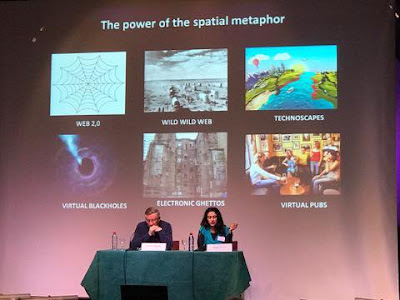Keynote at Digital Fortress Europe in Brussels

I delivered a keynote on 'Amplified activism from afar" in addressing border-making through social media and how diasporas can be powerful forces to contend with in the shaping of national agendas, policies and even grassroots social movements. This was for the ECREA organized event called "Digital Fortress Europe: Exploring Boundaries between Media, Migration and Technology" held in Brussels end October. The two-day conference served as a forum to "reflect on the relations between media, migration, and technology. These relations demand our fullest attention because they touch on the essence of what migration means in societies that are undergoing democratic challenges. Research shows that media and technologies play a vital role for people who migrate, but that the same media and technologies serve to spread xenophobia, increase societal polarization and enable elaborate surveillance possibilities. With its intensifying anti-migration populist discourse...













